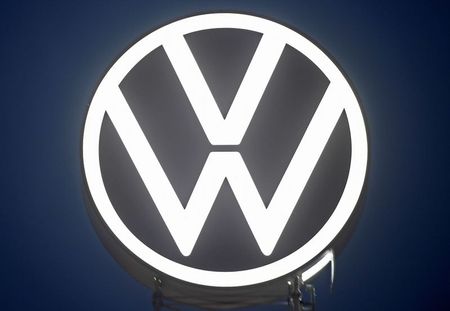By Arno Schuetze and Christoph Steitz
FRANKFURT (Reuters) -Volkswagen is to sell a stake in its electric vehicle charging unit Electrify America, two people familiar with the matter said, as the carmaker looks for outside funds to build infrastructure for battery-powered cars.
Volkswagen is working with Citi to look for a co-investor that is prepared to inject roughly $1 billion into the division, the people said, adding that the company is expected shortly to reach out to infrastructure groups and other potential investors.
Volkswagen, Electrify America and Citi declined to comment.
Set up in the aftermath of Volkswagen’s emissions cheating scandal that broke in the United States, Electrify America plans to spend $2 billion in the 2017-2026 period to expand charging stations for electric vehicles (EV).
The unit, whose main rivals include ChargePoint and Tesla’s Supercharger, has 635 charging stations with around 2,850 fast-loading spots up and running, according to its website.
This includes ultra-fast high-speed of up to 350 kilowatt charging stations enabling owners to load their cars in under 20 minutes.
The company expects to install or have under development about 800 charging stations with about 3,500 fast chargers by December 2021, expanding to 45 states, including two cross-country routes. It also operates solar-powered charging stations.
At Volkswagen’s Power Day in March, Electrify America Chief Executive Giovanni Palazzo, who joined Volkswagen from Daimler a decade ago, said that the group was planning to expand further.
Volkswagen, which will present its new strategy on July 13, is currently trying to consolidate its various charging efforts under the Charging & Energy business area led by Elke Temme, a long-time executive at Germany’s top utility RWE.
Charging infrastructure has attracted several sectors, including utilities, carmakers and big oil firms, all hoping to cash in on a rising demand for electricity in the wake of a global EV rollout.
Sources told Reuters last week that Renault and Shell were both interested in becoming co-owners in Ionity, the European EV charging joint venture owned by BMW Hyundai, Ford, Daimler and VW.
(Additional reporting by Ben Klayman; Editing by Nick Macfie)





